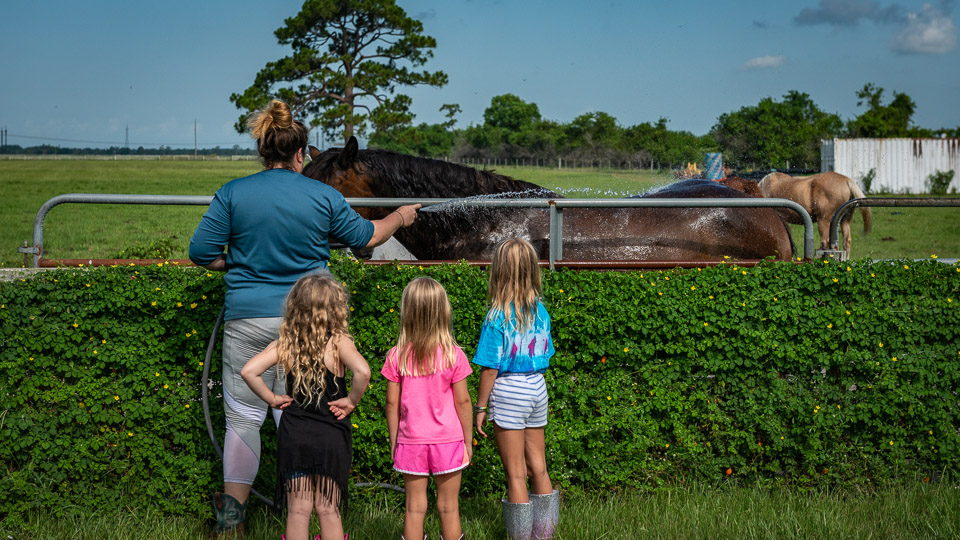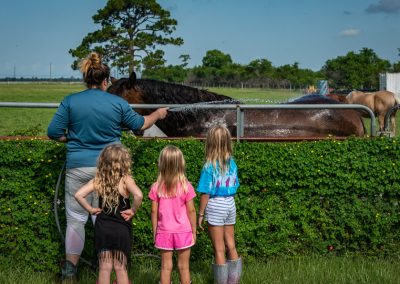
Horse Metabolism And Hormones – Anhidrosis (Non-sweating)
I mean, no sweat as in your horse has stopped sweating. For anyone in the latitudes where it never gets above 85 degrees F or the humidity is moderate, you will never know what I’m talking about.
I wish I had a picture of the first horse I had actually known with anhydrosis (the medical term for non-sweating and also spelled anhidrosis). Only his head and nostrils could be seen while his remaining body remained below the surface of the water. More common are the horses standing in front of fans, nostrils flared, rib cage heaving as they struggle to remain cool without the benefit of the cooling effect of evaporating moisture from their skin.
**CONTINUED IN ARTICLE TAB**
Related material – Sometimes I have a lot of material here that I have written, podcasted, video blogs and other things. They will be listed in this tab.
Use the browser back button or menu to return to the index of topics.
⬇︎ CLICK ANY IMAGE BELOW TO REVEAL MORE INFORMATION ⬇︎
I mean, no sweat as in your horse has stopped sweating. For anyone in the latitudes where it never gets above 85 degrees F or the humidity is moderate, you will never know what I’m talking about.
I wish I had a picture of the first horse I had actually known with anhydrosis (the medical term for non-sweating). Only his head and nostrils could be seen while his remaining body remained below the surface of the water. More common are the horses standing in front of fans, nostrils flared, rib cage heaving as they struggle to remain cool without the benefit of the cooling effect of evaporating moisture from their skin.
As a vet student at Cornell, not much was said about this condition of horses. Little was written about it. Treatments spread about the horse world with anecdotal evidence to their effectiveness. Guinness Extra Stout ale, other dark ales, any beer are all common remedies. Acupuncture, the Equi-Patch, 1AC, misting fans, Ventipulman (albuterol) and prostaglandin injections all have reports of working to some degree in some horses.
Some Degree – Some Horses
No one has determined why some horses in the same environment stop sweating while others do sweat but we know that every horse is different with different responses to triggers. And no one (to my knowledge) has determined the mechanism behind anhydrosis.
Accidentally we have found a cure that seems to work in every horse we try it with and we need your help to give us more examples of this treatment’s success. It is August and it is hot. Will you help us figure this out?
Most of you already know that we are not big fans of feeding grain to any horse. This includes corn, oats, wheat, and especially wheat middlings which are inconsistent in nutritive value and are very inflammatory in most horses. As we convinced horse owners that grains cause inflammation in the gut with unwanted behavioral events, we also heard that some non-sweating horses started to sweat. We need more numbers to confirm this so if your horse isn’t sweating (to any degree), please try this and tell us.
What To Do
Step one – stop feeding your horse all grain, carrots, sugar, treats and red trace mineral salt licks (sugar). Only feed pasture, hay (grass or legume), real salt and water. NOTHING ELSE. Adding a handful of hay pellets or hay cubes to a bucket at “feeding time” is allowed.
Step two – wait about 4 days while continuing on this simple diet of grass, hay, salt and water. If past experience is true, then your horse will start to sweat about day three and really sweat by day 4.
Step three – report back your results in the comment section of this blog.
I must assume that digestive tract inflammation, leaking gut and/or general malaise is behind anhydrosis, I would like to understand the physiological principles behind this but as a horseman, getting an effective treatment is what counts. If horses start to sweat after removing grain and other uncommon sugars, then all the other benefits might also be worth considering.
Grain Intolerance
If your horse shows one or more of the following then there may be a degree of grain intolerance and gut inflammation.
- Chronic poor body condition (thin) despite feeding large amounts of grain
- Chronic spasmodic (non-surgical) colic
- Squirts or dribbles fecal matter when defecating – stains the stall wall
- Girthiness (shifts feet, swishes tail, puffs up)
- Uncomfortable being brushed
- Unwilling or difficult behavior on the ground or while ridden
- Bucking or hopping when moving into the trot or canter
- Unwilling to load into a trailer or difficult when trailering
- Non-sweating to any degree
All of these have been resolved in client’s horses by taking the 2 week no-grain challenge. Learn more about grain problems at TheEquinePractice.com/grain. Take the 2 week no-grain challenge with your non-sweating horse and post the results. No harm in this and no cost either. You can’t lose though your horse might sweat a bit.
A video of horses with a high respiratory rate. The 2nd horse has anhidrosis.
- Additional tables
- Links to other in house articles
- Links to outside articles
- Reference material used in developing this topic.
There are no related articles here if you don’t see linked items.



Responses